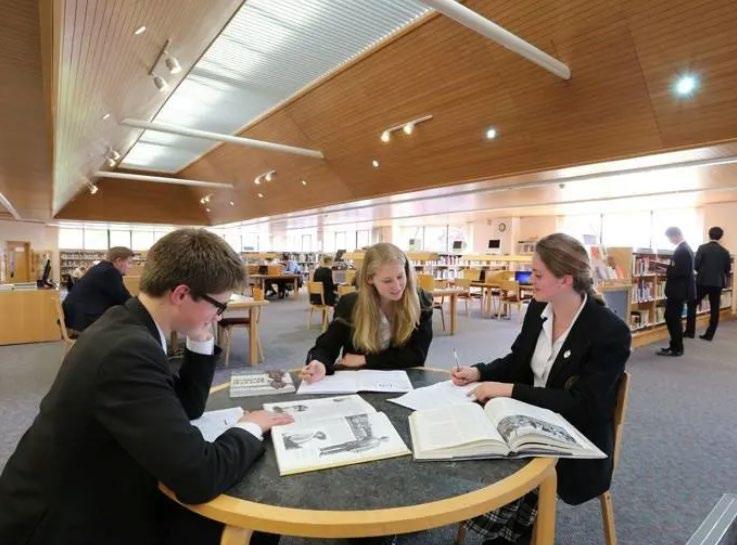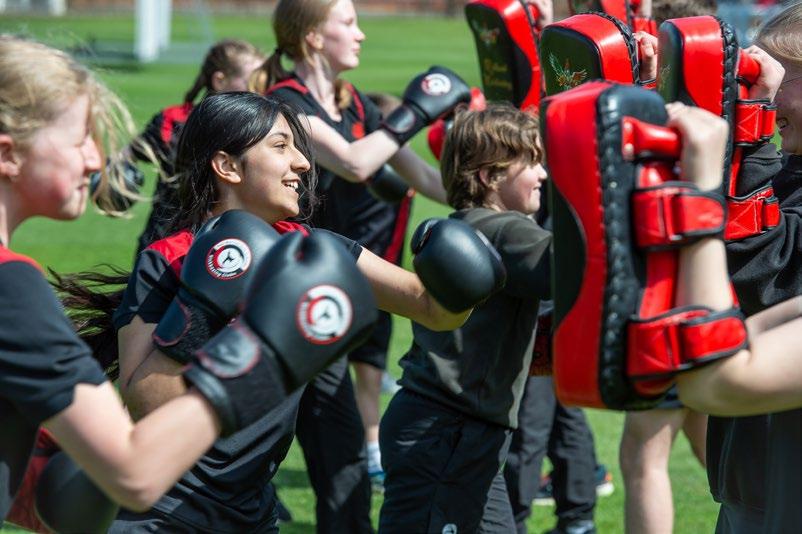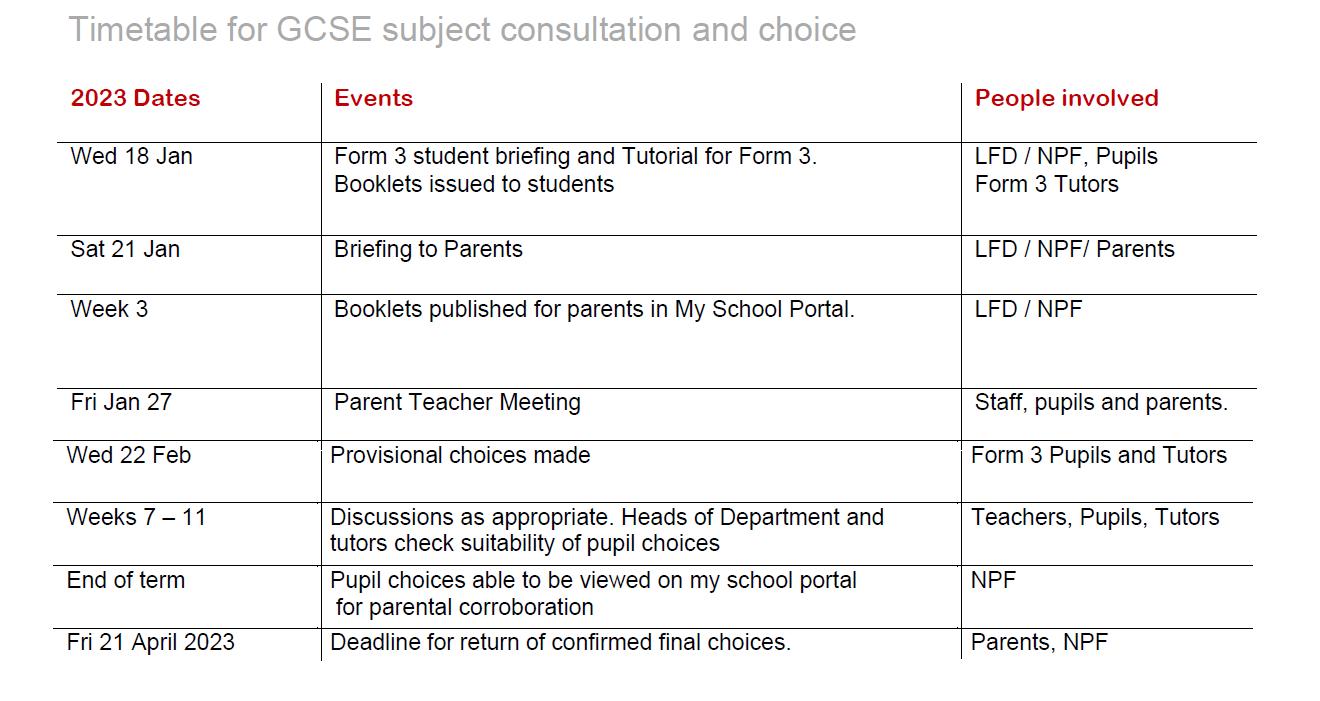Middle School Curriculum: Guided Choice 2023

A summary of the wider context and how the GCSE choices grids work
Dr Leo Dudin, Deputy Head Academic
Mr Nicholas Favill, Head of Middle School
Our Purpose
Who we are
Our purpose is to teach our pupils knowledge, skills, and values to thrive and confidently contribute at Oakham School and beyond. We will provide exceptional, contemporary co-education with a global outlook, offering experiences to learn in a caring and inspiring boarding and day community.


Our Values
We encourage all pupils and staff to articulate and embody our core values:
Care lies at the heart of everything we do.
Courage and Contribution are behaviours we wish to inspire.
Our Strategic Objectives
1. Educational Excellence
To deliver an innovative, ambitious and challenging education fit for the 21st Century by fostering a love of learning through a broad, balanced and connected curriculum underpinned by our core values.
We want pupils to seek and find Connection in all aspects of their education and future lives.
New legislation
The changing landscape

Promote pupil welfare Celebration of individuality


Core skills needed to thrive


Human-only skills

Knowledge & skills for success


Greater value

Academic learning + Co-curricular learning + Pastoral learning










The Connected Curriculum

Previous offering: 10 GCSEs
Issues with previous offering
- Pupil busyness in/after school day
- Need to formally teach RSE in timetable

- Support for most talented
- Support the full range of academic abilities
- Support for skills acquisition
- University requirements (8 good GCSEs needed…)
- Pupil attainment (…but are pupils getting 8 good GCSEs?)

All-rounder, enjoys sport and many subjects
Evolved offering: 9 +/-1 GCSEs
- Greater choice & better pace
- Greater balance of academic, co-curricular & pastoral learning opportunities


- Pastoral learning embedded
- Greater opportunities for academic support
- Better tailored to individuals
Likes two of the sciences
Keen actor, lots of LAMDA lessons
Offerings tailored to each individual
Loves maths
Time for Learning Support helps
Really broad academic interest, little interest in activities
Supporting evidence
- University evolving expectations
- Judged on 8 high quality GCSEs
- Increasing focus on Maths and English achievement
- Highest-tariff courses may also interview or conduct aptitude tests
- Internal observations from recent years
- Some pupils drop a GCSE late in the course
- An Oakham education is busy – we want pupils to embrace the Connected Curriculum, learning in all three arenas

- High-quality homework – timing is everything
- Sustainable pupil wellbeing requires correct balance of challenge and support
Academic learning + Co-curricular learning + Pastoral learning

Pastoral learning
Pastoral Care

Pastoral Learning

Parents
HMs
Tutors
Matron
Medical centre Teachers
Peers
How do I learn to navigate my way by myself in an increasingly complicated world
Pastoral learning

Health and well being
• Physical and mental health
• Sexual health and fertility
• Digital resilience
• Substance misuse
Relationships
• Healthy relationships
• Equal opportunities
Living in the Wider World
• Learning and target setting
• Careers and progression
• Money matters
Pastoral learning within the Connected Curriculum

An example: Consent
Knowledge: What does consent mean to a L1 pupil and then through the school to a Form 7 pupil.
Skill: Communication - speaking, listening and reading body language.
Value: Acknowledging and challenging behaviour that is not acceptable if it is against someone's will.
Pastoral learning within the Connected Curriculum

How:
The complexity of the world our children are growing up in means time must be allocated to allow them the opportunity to learn.
This needs to be delivered by subject experts. • Not all staff can be experts in all areas, but all pupils need to have the same opportunities to learn.
•
•
Academic learning + Co-curricular learning + Pastoral learning

Co-Curricular learning
Co-Curricular learning


Over 125 activities each week, including DofE, CCF, Voluntary Action, Community Projects

-

- Sport is part of the weekly timetable

- Flourishing Creative and Performing Arts Departments

Compassion & hope

Communication
Innovation
Learning strategies
Social Self-management Research Thinking


Confident leaders

‘the skills to thrive and confidently contribute beyond Oakham School’
Academic learning + Co-curricular learning + Pastoral learning

GCSE choices
Compulsory subjects
Compulsory subjects:
Pastoral Learning
English Language
English Literature Mathematics

Modern Foreign Languages, at least
one
French
German
Spanish
Science
MFL
Pastoral Learning (not GCSE)
PE (not GCSE)
Sciences,
Physics
Chemistry
Biology
(Studying just two of these is possible)
Optional subjects
Creative and Performing Arts and other options

Art (3 options)
…and up to four more subjects chosen from History
Religion & Philosophy
Geography
Another Modern Foreign Language
Creative / Performing / Other Options
Design Technology
Drama
Music
Citizenship
Classical Civilization
Computer Science
Latin
Greek and Latin (‘Gratin’)
GCSE Physical Education
French German Spanish
The choices grid
History Geography
Latin
Religion & Philosophy
Separate Sciences
French Geography
History
Religion & Philosophy
Art: Painting & Mixed Media
Art Textile Design
Art 3D Design
Design Technology
Drama
Music
Computer Science
Latin
Greek & Latin (‘Gratin’)
Physical Education
Separate Sciences
Art: Painting & Mixed Media
Art Textile Design
Design Technology

Drama
Music
Citizenship
Classical Civilisation
Computer Science
Geography
History
Physical Education
A B C D E
Science
This is actually the best route for most pupils who are less keen on one science, as they: don’t have to study too much of their least preferred science, as the content covered is less; they may find they like it more over time as the courses progress; and potentially lower marks in one science can be offset by better marks in the other two, as all marks are combined in the final grading process.


• The usual route is called Double Award, also called ‘Trilogy’
• Double Award covers all three sciences, and gives students two GCSEs
• Most pupils will do Double Award: it is entirely sufficient for studying Science in the Upper School
• Some pupils might want to do three Separate Sciences, receiving three GCSEs, but this limits what else they can do as it takes up one of the option blocks. (B or D)
• It is now also possible to study two Separate Sciences, receiving two GCSEs, but this limits what else they can do as it takes up one of the option blocks. (B or D)
Choosing two Separate Sciences is only recommended for pupils who are a) good at science b) really like the two sciences continued with and c) really want to study other non-science subjects, hence the desire to drop a science to allow space for that subject.
9 GCSEs: possible routes

9 GCSEs: Double Award Science. This is possibly the most common route for pupils

An example of how the grid works for a typical pupil, showing the number of GCSEs in green below the subject. This pupil is doing 9 GCSEs, has chosen Double Award, one MFL, and three options from Blocks C, D and E. They have not chosen from Block B (shaded yellow). This frees up 3 ppw in Block B, which will be used for 1 x pastoral learning lesson and 2 x supervised private studies. They could choose to leave any one of B, C, D or E blocks blank. MFL is compulsory for pupils studying 9 and 10 GCSEs, not for those choosing 8.

9 GCSEs: possible routes





9 GCSEs: Three Separate Sciences 9 GCSEs: Two Separate Sciences
10 GCSEs: possible routes



10 GCSEs: Three Separate Sciences


or 10 GCSEs Double Award Science

8 GCSEs: possible routes

8 GCSEs: Three Separate Sciences
or 8 GCSEs Double Award Science

Some pupils find academic learning harder, or are very busy with other sporting, acting, music, art, or service commitments inside/outside of school, and have very busy evenings and weekends.


8 GCSEs could suit these pupils as they benefit from the extra time in the school week to get some prep tackled in school (with the 3 x extra private study sessions a week, a second column shaded yellow).


What is the right balance?
What now?
We are advising the majority of pupils to study 9 GCSEs, with the recognition that some may opt to study 10 or 8 GCSEs

Pupils will read the booklet • Pupils should discuss with tutors, teachers, HMs, parents and more
• Pupils have been encouraged to ask plenty of questions particularly in relation to what is covered in the various courses and what it is like to study these courses for two years. They can speak with senior pupils.
Main message
This is an important decision that will lead to: - a broad and enjoyable academic curriculum
- while ALSO allowing pupils to make the most of pastoral learning and co-curricular learning opportunities
- All three are important if pupils are to thrive at Oakham and beyond

•











































